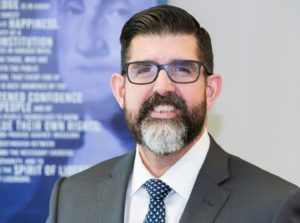Teach Florida celebrates first anniversary of nation’s largest education choice expansion
(reimaginED) – Like most birthday parties for 1-year-olds, this one had cake. It featured remarks from guests who were impressed with the past 12 months of growth. It included predictions about…

(reimaginED) – Like most birthday parties for 1-year-olds, this one had cake. It featured remarks from guests who were impressed with the past 12 months of growth. It included predictions about continued growth.
What was unusual about this birthday party was that its purpose was to mark the first anniversary of a piece of landmark legislation – Florida House Bill 7045, the nation’s largest expansion of education choice.
“Amazing things are happening, and we’re here to celebrate those amazing things,” said Daniel Aqua, the executive director of Teach Florida, a division of Teach Coalition, a national Jewish organization that promotes secure, strong, and affordable nonpublic schools.
The organization sponsored the event, held at Yeshiva Elementary School in Miami, to thank lawmakers and others who supported the bill and to encourage support for expansion.
Speakers included state Rep. Randy Fine, R-Palm Bay; state Rep. James Bush III, D-Opa Locka; Jim Rigg, superintendent of schools for the Archdiocese of Miami; Dr. Martin Karp, a former vice chairman of the Miami-Dade School Board; and John F. Kirtley, chairman of Step Up For Students, the nation’s largest scholarship funding organization and the host of this blog.
Fine, who sponsored HB 7045, retold a story he has shared on the House floor about his reasons for championing education choice.
“This is the story of two 13-year-old Jewish boys,” he said. The first boy “was the only Jewish boy who went to his government-run school. People would tease him and pick on him. They would beat him up.”
Fine said the bullying escalated to the point that it was no longer safe for the boy to eat lunch in the cafeteria or use the student restrooms. The boy begged his parents to “get me out of this school.” His parents were great parents, Fine said, but “they didn’t have a lot of money.” The boy “had to tough it out” but later graduated and enjoyed a successful career.
Fine said the second boy told his parents that a student had made an anti-Semitic comment, but the school didn’t do much to help. The boy’s parents had money and were able to transfer him to a school where he thrived.
“The first boy was me,” Fine said. “The second boy was my son.”
He added: “That’s not the world we should live in. We should not live in a world where you have to be rich to have options.”
Fine used the story to illustrate his belief that education choice programs should be further expanded to be accessible to all families.
“Every family needs to have the same options,” he said.
Bush, who was one of five House Democrats who supported the Republican majority in voting for HB 7045, thanked all those who supported it.
“I believe we must empower our parents so that they will have the opportunity in the future to determine what is best for their child and their student, and I believe that one size does not fit all,” he said, pointing out that the legislation gave 3,900 students in his district the opportunity attend a school that can address their specific needs.
Rigg, who moved to south Florida from Chicago after the bill had been approved, said it is gratifying to be part of a state that affirms parents’ right to make decisions for their children.
“I’m thrilled to see what happened when our wonderful choice programs were expanded even further,” he said, referring to House Bill 3, which granted automatic eligibility to dependents of law enforcement officers and was approved during the 2022 session.
Kirtley, who helped found the education choice movement in Florida two decades ago, said choice has improved Florida’s overall performance over the past 20 years, even though it drew strong opposition in the beginning.
He recalled how the state’s redefinition of public education prompted a 2014 court challenge. A massive rally two years later clearly showed how popular choice had become for families when more than 10,000 supporters arrived at the state Capitol in Tallahassee to defend their rights.
Kirtley pointed to the crowd’s diversity, which represented a variety of races, faiths, and philosophies.
“Your Orthodox community responded. You joined 10,000 people to march and protest this lawsuit, he said. “You are on the edge of a revolution. You are revolutionaries.”
The lawsuit failed in two lower courts and was rejected by the Florida Supreme Court in 2017. Despite the win, Kirtley encouraged audience members to continue to advocate for their right to make the best educational choices for their children.
“We won, but we’ve got to be vigilant,” he said. “We can’t relax.”
This article originally appeared at reimaginED.



